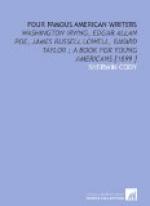WHAT MR. ROBINSON THINKS.
Guvener B. is a sensible man;
He stays to his home an’
looks arter his folks;
He draws his furrer ez straight ez he
can,
An’ into nobody’s
tater-patch pokes;
But John P.
Robinson he
Sez he wunt vote
fer Guvener B.
My! aint it terrible? Wut shall we
du?
We can’t never choose
him o’ course—thet’s flat;
Guess we shall hev to come round, (don’t
you?)
An’ go in fer thunder
an’ guns, an’ all that,
Fer John P.
Robinson he
Sez he wunt vote fer Guvener B.
Gineral C. is a dreffle smart man:
He’s ben on all sides
thet give places or pelf;
But consistency still wuz a part of his
plan—
He’s been true to one
party—an’ thet is himself;
So John P.
Robinson he
Sez he shall vote
fer Gineral C.
Gineral C. he goes in fer the war;
He don’t vally principle
more’n an old cud;
Wut did God make us raytional creeturs
fer,
But glory an’ gunpowder,
plunder an’ blood?
So John P.
Robinson he
Sez he shall vote
fer Gineral C.
The side of our country must ollers be
took,
An’ President Polk,
you know, he is our country.
An’ the angel that writes all our
sins in a book
Puts the debit to him,
an’ to us the per contry;
And
John P.
Robinson
he
Sez
this is his view o’ the thing to a T.
There is a story that Mr. Robinson couldn’t go anywhere after this poem was published without hearing some one humming or reciting,
Fer John P.
Robinson he
Sez he wunt vote fer Guvener B.
School children shouted it everywhere, people on the street repeated it as they met, and the funny rhyme was heard even in polite drawing-rooms, amid roars of laughter. Mr. Robinson went abroad, but scarcely had he landed in Liverpool before he heard a child crooning over to himself,
Fer John P.
Robinson he
Sez he wunt vote fer Guvener B.
In Genoa, Italy, it was a parody, telling what John P.—Robinson he—would do down in Judee.
CHAPTER VIII
PARSON WILBUR
In the course of time the “Biglow Papers” were published in book form. Not only was Lowell’s name not yet connected publicly with the Yankee humor, but the poems were provided with an elaborate introduction, notes and comments, by the learned pastor of the church at Jaalam, Homer Wilbur. His notes and introduction are filled with Latin quotations, and he appears as much a scholar as Hosea Biglow does a natural. He says he tried to teach Hosea better English, but decided to let him work out his own ideas in his own way. Still, he endorses Hosea’s principles, and is in every way thoroughly his friend.




